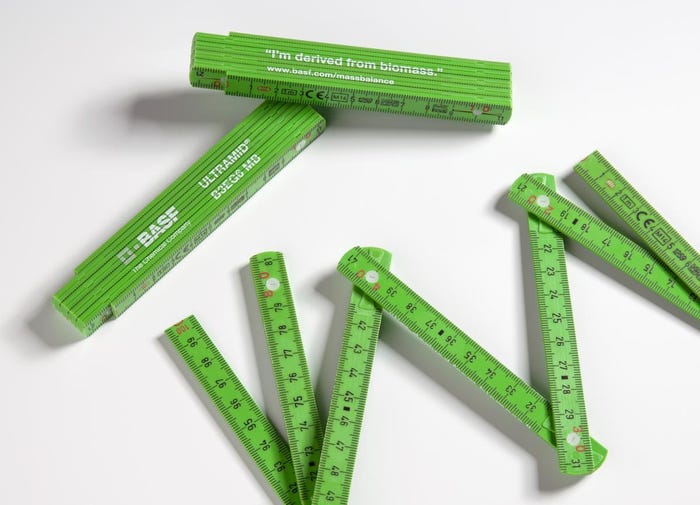BASF has announced that Kunststoffwerk AG Buchs, a subsidiary of Wiha Werkzeuge GmbH, has become the first customer to use its new Mass Balance PA for the serial production of one of its products. BASF sees what it is calling the "mass balance" approach as a means to save fossil raw materials and reduce greenhouse gas emissions, which in turn contributes to sustainable development.
October 16, 2014
BASF has announced that Kunststoffwerk AG Buchs, a subsidiary of Wiha Werkzeuge GmbH, has become the first customer to use its new Mass Balance PA for the serial production of one of its products. BASF sees what it is calling the "mass balance" approach as a means to save fossil raw materials and reduce greenhouse gas emissions, which in turn contributes to sustainable development.
Developed in collaboration with TÜV SÜD (a third-party certification body), this approach allows for the use of renewable feedstocks in its integrated production processes. Biomass - for instance, in the form of biogas or bio-naphtha from certified sustainable production - is used as a feedstock in place of fossil resources at the beginning of the value chain, i.e. in the manufacturing of basic products in existing production plants. "As with their petrochemical analogs, they are fed into plants at the beginning of the production process: bio-naphtha into the steam cracker and biogas into the syngas plant," said Lars Börger, new business development in the performance materials division. This biomass content is then allocated to the different products according to their recipes using the new certified methodology. Up to 100% of the fossil raw materials can be replaced in the end product, which can be marketed accordingly. The quality of the products remains unchanged.
 TÜV SÜD Industrie Service GmbH has many years of experience in the field of energy certification and sustainability certification of bioenergy. Its international recognition and outstanding reputation secure high acceptance of the certificates. Hence, any customer who purchases a ton of mass-balanced product can be certain that BASF has used renewable feedstock to replace the corresponding amount of fossil raw materials needed to produce the product. Depending on what the customers wants, between 25% and 100% of the feedstock needed can be replaced.
TÜV SÜD Industrie Service GmbH has many years of experience in the field of energy certification and sustainability certification of bioenergy. Its international recognition and outstanding reputation secure high acceptance of the certificates. Hence, any customer who purchases a ton of mass-balanced product can be certain that BASF has used renewable feedstock to replace the corresponding amount of fossil raw materials needed to produce the product. Depending on what the customers wants, between 25% and 100% of the feedstock needed can be replaced.
Kunststoffwerk AG Buchs is the first BASF customer to process and use the engineering plastic Ultramid B3EG6 MB for serial production of its Longlife brand of meter sticks. The polyamide used is one of the first BASF products to be produced and marketed on the basis of the mass balance approach. According to the mass balance approach certified by TÜV SÜD, 100% of the fossil raw materials needed to make Ultramid B3EG6 MB are replaced with renewable raw materials at the beginning of the production process. The abbreviation MB indicates the calculation via the mass balance approach. The certified MB plastic is identical to its fossil counterpart in terms of formulation and quality, and is already available in commercial quantities.
About the Author(s)
You May Also Like


